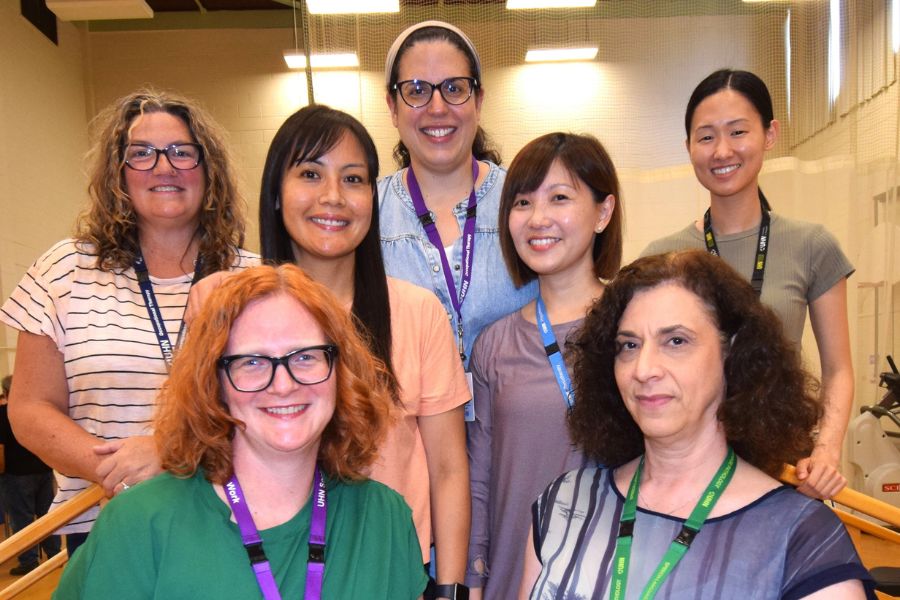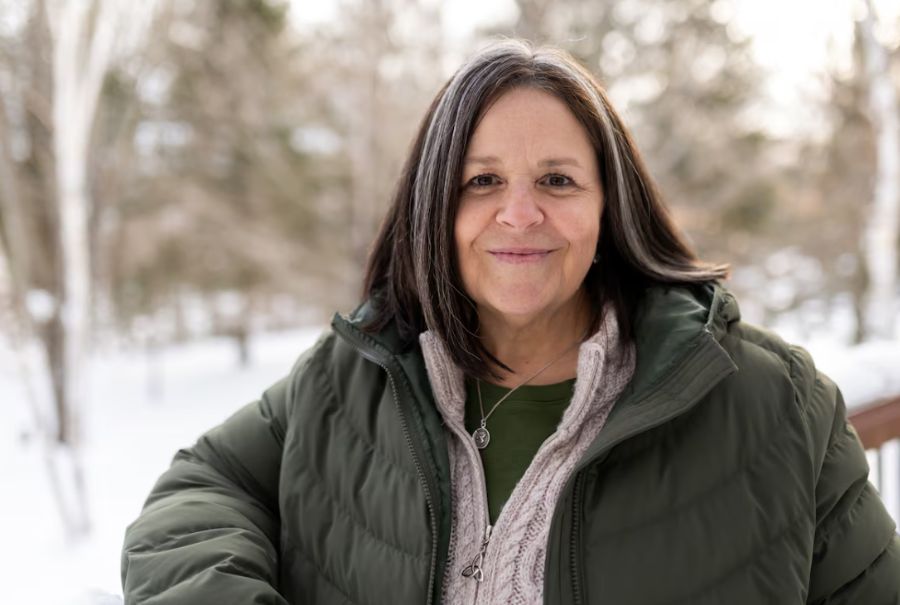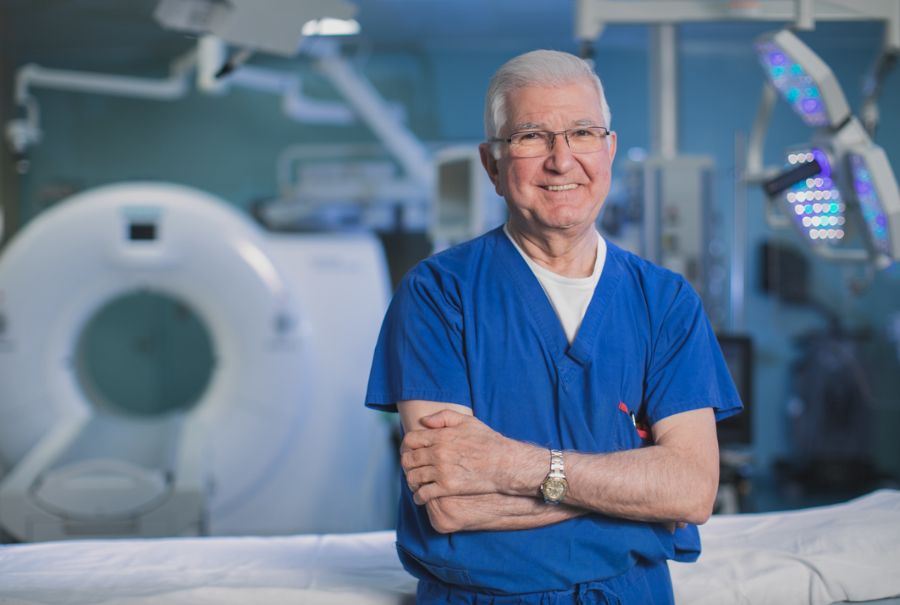“Many trans persons are forced to lead double lives because they don’t feel safe to come out to their families or at work,” says Noe Soficci, who with the support of loved ones and the University Health Network 2SLGBTQIA+ Committee has regained confidence in herself and is on the journey to re-transition physically to live and work as who she is – a woman. (Photo: Courtesy Noe Soficci)
Reflecting on the significance of Transgender Day of Remembrance, Noe Soficci passionately described her emotions.
“It’s a sad moment for me when I think of all the lives lost, who they could have been, how their lives were cut short just for being who they were,” she says. “Losing so many friends makes a huge impact on you. Going to work each day, I think: ‘Am I the next to be killed?”
Noe (pronounced as NO-ee) is a ward clerk in the Emergency Department at the Toronto Western Hospital and an active member of the UHN 2SLGBTQIA+ Committee. She is also a trans woman.
As the chair of Trans Pride Toronto, she advocates for increased employment and housing opportunities, as well as food programs for transgender (trans) persons.
Unfortunately, employment for Noe came at the price of her identity. Despite having all necessary qualifications, Noe felt forced to detransition and present herself in the gender she was assigned at birth (male) because of the discrimination and transphobia she faced.
“Many trans persons are forced to lead double lives because they don’t feel safe to come out to their families or at work,” Noe explains.
With the support of loved ones, and after joining the UHN 2SLGBTQIA+ Committee, she eventually re-gained confidence to stay authentic to herself. Noe is now on the journey to re-transition physically to live and work as who she is – a woman.
In Canada, trans people continue to face high levels of discrimination. Starting Nov. 13 each year, Transgender Awareness Week is intended to increase trans visibility and raise public awareness around issues that trans, two-spirit, and gender-diverse communities face. The week ends with Transgender Day of Remembrance, held on Nov. 20 every year.
Transgender Day of Remembrance honours and memorializes trans, two-spirit, and gender-diverse individuals who were murdered in acts of transphobic violence. The day was initiated in 1999 by trans advocate and educator Gwendolyn Ann Smith, who held a vigil for Rita Hester, a Black trans woman who was murdered in her home the previous year. An outpouring of grief and outrage for justice transformed into a global day of observance to remember those who were murdered.
‘It really is hate that drives violence against persons of trans communities’
Trans communities and allies mark this important occasion each year through candlelight vigils to honour the memory of those killed. Film screenings and other celebrations of life are also organized to draw awareness to the issues and human rights violations that trans communities continue to endure and resist.
Within the past year, there were 375 registered murders of trans people worldwide. However, the true number of victims is unknown because many cases go unreported, including here in Canada.
Most murders of trans people remain unsolved, and the identity of victims – including the gender and names they lived their lives by – are often misreported.
When considering the root of this violence, Noe encourages us to ponder the term “transphobia,” which encompasses a number of negative attitudes, feelings and actions towards the community, from verbal abuse to acts of physical violence.
“While transphobia literally means ‘fear (or -phobia) of trans persons’, the better term might be ‘transmisia,’ which is hate (or -misia) against trans persons,” Noe says.
Transmisia represents systemic discrimination against trans persons. Considering how race and class also intersect with gender identities, trans communities of colour suffer compounded effects of oppression and violence. Indeed, trans women of colour are disproportionately targeted in incidents of anti-trans violence.
Problematic media representations of trans people also play a role in the systemic discrimination faced by the community. Noe highlights that trans persons are overly sexualized in the media and this gives rise to misperceptions, and eventually to sexual violence.
“Perhaps it comes from fear, ignorance or misunderstandings of who we are, but it really is hate that drives violence against persons of trans communities,” Noe says.
While annual statistics on violence against trans individuals in Canada are not widely available, a 2020 report from Statistics Canada, which uses 2018 data, highlights that trans Canadians are more likely to experience violence compared to cisgender individuals. Trans people are also more likely to be subjected to inappropriate behaviours in the workplace and face bias in hiring decisions when seeking employment and when applying for educational opportunities.
“No matter what your qualifications are, society looks down at you like you have less value,” Noe says.
Interruptions to healthcare access and gender-affirming care exacerbated by pandemic
Large disparities in healthcare also exist for trans people in Canada. A 2020 report from Trans PULSE Canada found 45 per cent of trans and non‑binary Canadians had an unmet healthcare need within the past year, compared to just four per cent in the general population.
The COVID-19 pandemic has exacerbated these healthcare disparities, and trans people have reported interruptions in receiving gender-affirming care. Within healthcare settings, trans individuals can also experience transphobia from their healthcare providers, including misgendering and use of incorrect names or pronouns.
Despite these grim statistics and findings, Noe has optimism for better times.
“I feel empowered as I am here to stand up and speak on behalf of those who are unable to speak for themselves, to create more awareness as a society towards treating everyone with humanity,” she says.
Kirsten Engelbrecht, a registered vascular technologist at the Peter Munk Cardiac Centre, and Co-Chair of the UHN 2SLGBTQIA+ Committee, offers her support.
“Trans, two-spirit, and gender-diverse people ARE employees, health professionals as well as patients at UHN,” Kirsten says. “Those of us who are allies must do better to educate ourselves and promote gender‑affirming care across the organization.”
On Transgender Day of Remembrance, the UHN 2SLGBTQIA+ Committee affirms continued solidarity with the Indigenous Health Program, the UHN Department of Social Medicine, and the Employee Resource Groups at UHN: Accessibility Advisory Committee, Black Legacy Committee, and the Pan Asian Committee towards trans-inclusivity and equitable care.
To raise awareness, the UHN 2SLGBTQIA+ Committee has organized informational posters and resource tables that will be featured throughout Trans Awareness Week in the lobby of each UHN site. All are invited to engage with these resources.


